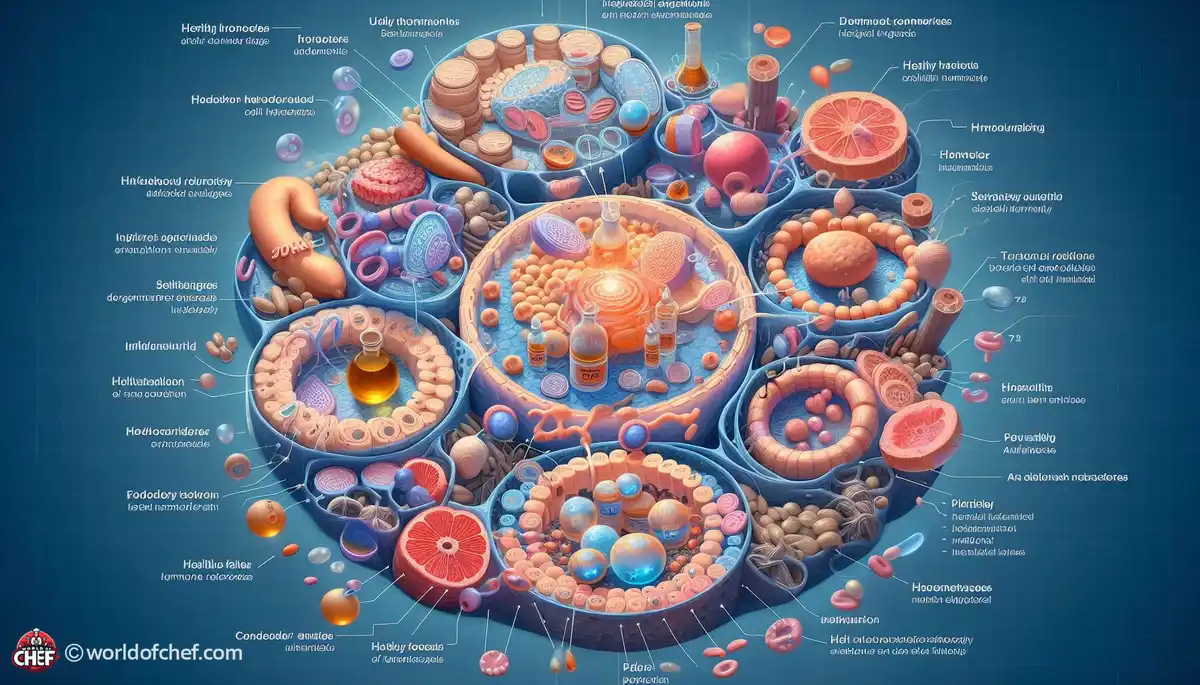
The Healthiest Oils for Cooking: A Comprehensive Guide
Juan Welborn - Oct 29, 2024 - 11 min read


Healthy fats often get a bad rap in the world of nutrition, but they play a crucial role in our overall health, particularly when it comes to hormone regulation. Hormones are the body's chemical messengers, influencing everything from mood to metabolism. Understanding the link between healthy fats and hormones can empower you to make better dietary choices that support your body’s needs.
Fats are often classified into three main categories: saturated, unsaturated, and trans fats. Healthy fats typically refer to unsaturated fats, which can be further divided into monounsaturated and polyunsaturated fats. Monounsaturated fats are found in foods like olive oil, avocados, and nuts. Polyunsaturated fats include omega-3 and omega-6 fatty acids, which are essential for the body and must be obtained through diet. Unlike trans fats, which are harmful and should be avoided, healthy fats offer numerous Health Benefits when consumed in moderation.
Incorporating Healthy Fats into your diet can provide numerous health benefits. They help the body absorb essential vitamins such as A, D, E, and K, which are crucial for various bodily functions. Additionally, healthy fats contribute to cell membrane integrity, ensuring that our cells function efficiently. They also play a role in reducing inflammation, a factor that can negatively impact hormone balance. By choosing healthy fats, you not only support your hormonal health but also promote overall wellness.
When it comes to adding healthy fats to your diet, there are plenty of delicious options. Foods rich in monounsaturated fats include olive oil, avocados, and nuts like almonds and cashews. For polyunsaturated fats, consider Fatty Fish such as salmon and mackerel, as well as seeds like flaxseeds and chia seeds. These foods not only provide healthy fats but also come packed with other nutrients that contribute to a balanced diet. Experimenting with these foods can be a tasty way to enhance your meals while supporting your body’s hormonal needs.
Healthy fats are vital for the production of hormones in the body. Cholesterol, a type of fat, serves as a building block for steroid hormones, including testosterone, estrogen, and cortisol. When you consume adequate amounts of healthy fats, you support your body’s ability to produce these essential hormones. On the other hand, a low-fat diet can lead to hormonal imbalances, which may manifest in various ways, such as mood swings, fatigue, or weight gain.
Omega-3 fatty acids, found in fatty fish and flaxseeds, are particularly important for hormone regulation. They help reduce inflammation, which can positively impact hormone balance. Studies have shown that omega-3s may improve insulin sensitivity and promote the production of hormones involved in appetite regulation. By including sources of omega-3s in your diet, you can support your hormonal health and overall well-being.
While omega-3 fatty acids are essential for hormone regulation, it’s equally important to maintain a proper balance with omega-6 fatty acids. Both types of fatty acids are necessary for good health, but they need to be consumed in the right proportions. A typical Western diet often contains an excess of omega-6s, found in many processed foods, which can lead to inflammation and hormonal imbalances. Striking a balance by increasing omega-3 intake while moderating omega-6 consumption is crucial for maintaining hormonal health.
Cortisol, often referred to as the stress hormone, plays a significant role in how the body responds to stress. The foods we eat can influence cortisol production. Diets low in healthy fats may lead to elevated cortisol levels, as the body tries to compensate for insufficient nutrient intake. Consuming healthy fats can help mitigate this response, providing the body with the resources it needs to manage stress effectively.
Incorporating healthy fats into your meals can help balance cortisol levels. Foods rich in omega-3 fatty acids have been shown to help reduce cortisol production, particularly in response to stress. This reduction can lead to improved mood and better overall health. By making a conscious effort to include healthy fats in your diet, you can help your body maintain a more stable hormonal balance, particularly during stressful times.
To promote healthy cortisol levels, it’s important to adopt a holistic approach to stress management. In addition to consuming healthy fats, consider incorporating mindfulness practices, regular physical activity, and adequate sleep into your routine. These lifestyle factors can significantly impact hormonal health and overall well-being. By combining dietary changes with these strategies, you can create a supportive environment for your hormones to thrive.
Healthy fats are crucial for reproductive hormone regulation in both men and women. In women, healthy fats support the production of estrogen and progesterone, hormones that are vital for menstrual health and fertility. In men, healthy fats are essential for testosterone production. A balanced intake of healthy fats can help maintain optimal levels of these hormones, supporting reproductive health and overall vitality.
Omega-3 fatty acids are particularly beneficial for reproductive health. Studies have indicated that diets rich in omega-3s can improve egg quality in women and sperm quality in men. Additionally, omega-3s may help reduce inflammation, which can interfere with hormone balance and fertility. By prioritizing foods high in omega-3 fatty acids, you can enhance your chances of maintaining a healthy reproductive system.
When aiming for reproductive health, it's essential to focus on a balanced diet that includes healthy fats, lean proteins, and a variety of fruits and vegetables. This combination ensures that your body receives the necessary nutrients to support hormone production. Making informed dietary choices can lead to better hormonal health, positively impacting your reproductive well-being.
Healthy fats are not just beneficial for physical health; they also play a significant role in mental well-being. The brain is composed largely of fat, and consuming healthy fats can support brain function and mood regulation. Diets high in omega-3 fatty acids have been linked to lower levels of depression and anxiety, highlighting the importance of healthy fats in mental health.
Research suggests that omega-3 fatty acids can positively impact neurotransmitter function, particularly serotonin, which is often referred to as the "feel-good" hormone. Higher levels of serotonin are associated with improved mood and emotional well-being. By incorporating omega-3-rich foods into your diet, you may experience a more stable mood and a greater sense of emotional balance.
To support mental health, consider adopting a diet rich in healthy fats, particularly omega-3s. Foods like fatty fish, walnuts, and flaxseeds can provide the necessary nutrients for optimal brain function. Additionally, maintaining a balanced diet that includes a variety of nutrients can further enhance mood regulation. Taking care of your dietary choices can have a profound impact on your overall mental well-being.
Insulin is a crucial hormone that regulates blood sugar levels and plays a vital role in metabolism. Healthy fats can positively influence insulin sensitivity, making it easier for the body to use insulin effectively. Improved insulin sensitivity can help prevent various health issues, including obesity and type 2 diabetes, both of which are linked to hormonal imbalances.
Incorporating healthy fats into your meals can aid in blood sugar control. Fats slow down the digestion and absorption of carbohydrates, which helps prevent rapid spikes in blood sugar levels. This gradual release of glucose into the bloodstream can promote stable energy levels and reduce cravings. By focusing on healthy fats, you can support your body’s ability to manage blood sugar effectively.
To enhance insulin sensitivity, consider adopting a holistic approach that includes regular physical activity, adequate sleep, and a balanced diet rich in healthy fats. Foods like avocados, olive oil, and fatty fish can contribute to improved insulin function. Additionally, reducing processed carbohydrates and sugars can further support stable blood sugar levels. By making these dietary changes, you can promote better hormonal health and overall well-being.
Healthy fats are essential for maintaining hormone balance and overall health. By incorporating sources of healthy fats into your diet, you can support hormone production, improve mood, and enhance reproductive health. Understanding the connection between healthy fats and hormones empowers you to make informed dietary choices that benefit your well-being. Embrace healthy fats as a vital component of your diet, and enjoy the numerous benefits they bring to your hormonal health.

Juan Welborn - Oct 29, 2024 - 11 min read

Sydney Graziano - Oct 29, 2024 - 9 min read

Craig Ackley - Oct 28, 2024 - 12 min read

Carlos Palomares - Oct 28, 2024 - 12 min read